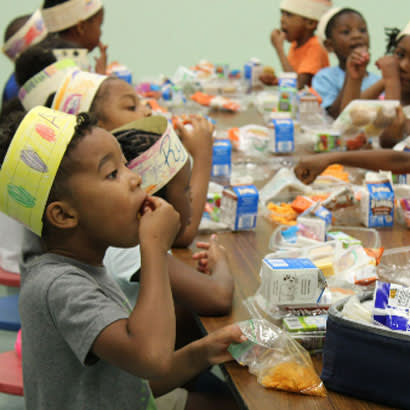
Pictured: Children sit down to enjoy lunch during Camp Superstars, a program hosted by the DeKalb Department of Recreation, Parks and Cultural Affairs in Decatur, Georgia. Photo courtesy of Dawn Cribb.
Every day, in communities across the country, park and recreation professionals are making their communities better places to live, learn, work and play through their role as stewards of Community Wellness Hubs – trusted gathering places that connect every member of the community to essential programs, services and spaces that advance health equity, improve health outcomes and enhance quality of life.
Over the past few years, you’ve probably heard us talk a lot about Community Wellness Hubs and the unmatched power of parks and recreation to lead the creation and expansion of them. We’ve released videos, magazine articles, grants and blog posts outlining our vision:
- Park and recreation professionals — and the programs and services they provide — are key to a fully integrated public health system. They play a vital role in advancing health equity, improving health outcomes and meeting the growing health and social needs of their communities.
- Together, with community members and partners, park and recreation professionals can leverage the full power of parks and recreation to advance systems-change strategies across seven dimensions of well-being, transforming our communities and helping to ensure that all people have a fair and just opportunity to thrive.
Today, we are thrilled to share a new toolkit to help advance this vision. Community Wellness Hubs: A Toolkit for Advancing Community Health and Well-Being provides a detailed overview of our vision, including why health equity must be at the center of this work and why solutions must focus on holistic well-being to address modern-day public health and social challenges. The toolkit is divided into five main sections:
1. Parks and Recreation as Community Wellness Hubs
2. How to Create a Community Wellness Hub
a. Four Primary Development Phases
b. Key Considerations Throughout the Development of a Community Wellness Hub
3. The Seven Dimensions of Well-Being
4. Strategies and Approaches to Advance Community Wellness Hubs
5. Case Studies From the Field
The toolkit outlines key processes for creating and functioning as Community Wellness Hubs, leveraging partners and existing resources and ensuring that community members’ voices and decisions are leading the way. It’s important to lift up that the model does not call upon park and recreation professionals to take on more roles, rather, it calls upon community institutions to come together to build upstream solutions that leverage existing resources and services and make them more accessible within our parks, recreation centers, neighborhoods and public spaces.
The toolkit also offers key systems-change strategies and approaches that park and recreation professionals can implement across seven interconnected dimensions of well-being – cultural, economic, emotional, environmental, intellectual, physical and social. Professionals have the power to change environments (both physical and social environments), policies (rules and regulations) and behaviors (norms and attitudes) at many levels of intervention to create transformative, system-wide change. Let's look at mental health for example:
- Policy: Enacting an agency-wide policy ensuring mental health programs are available, affordable, accessible and culturally specific for all community members, and prioritized and funded in under-resourced communities.
- Environmental: Ensuring access to green space for all community members within a 10-minute walk of home to promote the mental health benefits of the outdoors and offering structured programming that is proven to improve mental health (e.g., Tai Chi, meditation, yoga, mindfulness).
- Behavior: Sponsoring a community-wide Mental Health Awareness Day or Month that educates and encourages people to practice mindfulness and spend time in nature to support their mental health.
While the launch of this toolkit has been long-awaited, our work is only beginning. In the coming years and in alignment with our strategic plan and theory of change, we plan to build out a suite of professional development offerings, provide training and technical assistance, develop additional tools including one-pagers and learning modules, strengthen our storytelling and advocacy work so more resources are available federally, state-wide and locally for parks and recreation, and provide grant funding and other resources as able.
To get started, explore the toolkit and join us to dive deeper and hear from a handful of professionals leading this work during our upcoming talk on July 14!
Allison Colman (she/her) is NRPA's director of health.

